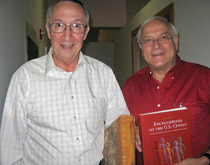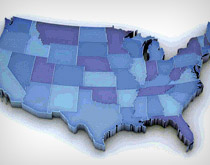
Statistics professors Stephen Fienberg and William Eddy—together with their colleagues Rebecca Nugent and Alessandro Acquisti in Heinz College—want to help change the way you will be recorded in the next U.S. Census. A century ago it was easy; a Census worker came to your door, wrote the information in a ledger, and the results were tabulated. Today, some people don’t want to be counted; others want to be counted “early and often.” But easy or not, the U.S. Constitution mandates that every person in the country be counted on Census Day: April 1 in the first year of each decade.
In 2010, the total came to 308,745,538. At stake was each of those individual’s constitutionally guaranteed right to equal representation in Washington, D.C., as well as their fair share of $400 billion in federal funds sent to state and local governments each year.

The massiveness of the $13 billion effort makes the Census the largest peacetime government undertaking since the Pyramids were built, which is why plans are already underway for 2020. The National Science Foundation has awarded $3 million to the CMU professors for research on statistical methods for matching Census records with records from the post-enumeration survey; estimating the number of people omitted or double counted; and improving methods for collecting the data on computers, tablets, and web-enabled telephones.
Fienberg and Eddy say they plan to work with researchers at the U.S. Census Bureau to ensure relevant, accurate information when the next census takes place on April 1, 2020.
—Tom Imerito
Related Links:
CMU's Stephen Feinberg Receive's Research Grant From National Science Foundation and U.S. Census Bureau



